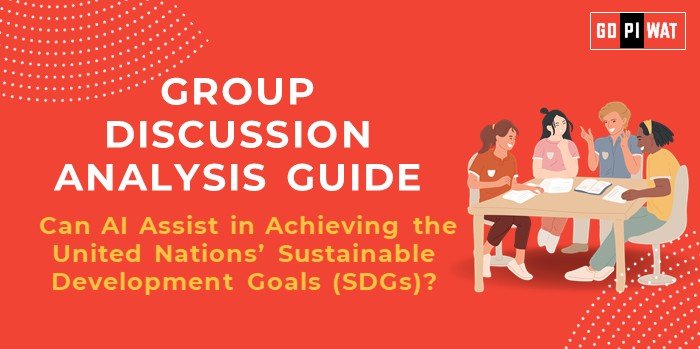📋 Group Discussion (GD) Analysis Guide
🌍 Topic: Can AI Assist in Achieving the United Nations’ Sustainable Development Goals (SDGs)?
🌐 Introduction
Opening Context: The United Nations’ Sustainable Development Goals (SDGs) aim to address pressing global issues like poverty, inequality, and climate change by 2030. Artificial intelligence (AI) is emerging as a transformative tool to accelerate progress toward these goals. Its capabilities in data processing, decision-making, and automation make it an essential ally in overcoming challenges and achieving sustainable development.
📊 Quick Facts & Key Statistics
- 🌍 Global AI Market Value: Projected to reach $184 billion in 2024, and surpass $826 billion by 2030 with a CAGR of 28.46%.
- 📉 SDG Progress: Only 15% of SDG targets are on track as of 2023, emphasizing the need for enhanced efforts.
- 🩺 AI in Healthcare: Transforming diagnostics and patient care, AI improves health outcomes and supports SDG 3 (Good Health and Well-being).
- 🌾 Agriculture: AI-driven technologies optimize farming practices, boost yields, and promote sustainability, aiding SDG 2 (Zero Hunger).
- 🌦️ Climate Modeling: AI enhances climate predictions and decision-making, aligning with SDG 13 (Climate Action).
🤝 Stakeholders and Their Roles
- 🏛️ Governments: Developing policies and funding AI initiatives to support SDGs.
- 🏢 Private Sector: Innovating scalable AI solutions for sustainable impact.
- 🌍 International Organizations: Ensuring ethical standards and fostering collaboration.
- 🎓 Academia: Conducting research on AI’s applications in SDGs.
- 👥 Citizens: Participating in AI-enabled programs for local development.
🏆 Achievements and Challenges
- Achievements:
- ✅ Healthcare: Enhanced diagnostics and personalized treatment improve health outcomes.
- 🌾 Agriculture: Increased efficiency in farming practices reduces resource wastage.
- 🌦️ Climate Action: Advanced climate modeling supports informed decision-making.
- Challenges:
- ⚖️ Ethical Issues: Bias and inequity in AI models.
- 🌍 Digital Divide: Limited AI access in underdeveloped regions.
- 📊 Data Availability: Inadequate datasets for diverse, inclusive AI models.
🌍 Global Comparisons
- 🇺🇸 USA: Leading AI in climate modeling for disaster resilience.
- 🇮🇳 India: Successful AI-powered educational platforms advancing literacy.
🧠 Effective Discussion Approaches
- Opening Approaches:
- 📈 “With a projected market value of $184 billion in 2024, AI’s transformative potential in achieving SDGs is undeniable.”
- ⚖️ “Despite technological progress, only 15% of SDG targets are on track, highlighting the urgent need for AI-driven innovation.”
- Counter-Argument Handling:
- “While AI raises concerns about ethics and equity, initiatives like AI for Good demonstrate collaborative efforts to mitigate these risks.”
🔍 Strategic Analysis of Strengths & Weaknesses
- Strengths: Versatility in addressing multiple SDGs, enhances real-time monitoring and decision-making.
- Weaknesses: Resource-intensive development and deployment, risk of biased algorithms.
- Opportunities: Potential to bridge gaps in education and healthcare, collaboration on global AI standards.
- Threats: Unequal access to AI resources, risk of misuse without proper governance.
📄 Structured Arguments for Discussion
- ✅ Supporting Stance: “AI is revolutionizing healthcare, agriculture, and climate action, making significant strides toward SDG achievement.”
- ❌ Opposing Stance: “The ethical, regulatory, and access challenges surrounding AI may limit its potential impact on SDGs.”
- ⚖️ Balanced Perspective: “AI’s transformative power in SDGs is undeniable, but its success depends on equitable access, robust regulations, and ethical development.”
📚 Connecting with B-School Applications
- 💼 Real-World Applications: AI’s role in sustainable development offers insights for ESG metrics, social entrepreneurship, and AI ethics frameworks.
- 📝 Sample Interview Questions:
- “How can AI address challenges in achieving SDGs?”
- “What ethical considerations arise in AI’s application for sustainable development?”
- 💡 Insights for Students: Explore AI’s potential for impact investment strategies and its integration into global business models.


